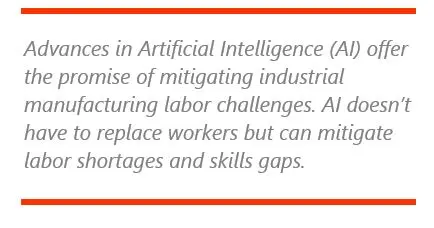

Keywords: Artificial Intelligence Technologies, AI, Generative AI, Analytics, Digital Transformation, Industrial Manufacturing, ARC Advisory Group.
In recent years, manufacturers have been grappling with the challenges of a tight labor market. The traditional approach of finding the “right person for the job” has become increasingly difficult due to skill shortages, demographic shifts, and increased competition for talent. However, with rapid advancements in Artificial Intelligence (AI) technology, there is a  growing opportunity for companies to shift their mindset towards finding the “right technologies,” such as implementing intelligent software and building intelligent machines to fulfill their operational needs.
growing opportunity for companies to shift their mindset towards finding the “right technologies,” such as implementing intelligent software and building intelligent machines to fulfill their operational needs.
AI is transforming the labor market in the manufacturing sector and resulting in powerful implications for business. This is not to say AI’s intention is to replace human workers, but the right technologies can be used to mitigate labor shortages and skills gaps. AI is already transforming the manufacturing industry by enabling greater efficiency, higher quality, and reduced costs. One of the key benefits of AI is its ability to analyze large amounts of data generated by sensors, machines, and other sources to identify patterns, anomalies, and insights that can be used to optimize processes and improve performance. For instance, AI can be used to predict equipment failures, detect defects in manufacturing lines, and optimize supply chain logistics.
We have only begun to scratch the surface with what is possible. Recent advances in the field of AI promise to revolutionize the way workers produce goods. These advances in AI could not have come at a better time. Industrial manufacturing companies are constantly faced with a multitude of challenges, both current and future, and must stay focused on improving their business operations to ensure their short- and long-term viability.
Industrial manufacturing companies face a multitude of challenges in today’s rapidly evolving landscape, and many of these challenges are closely tied to the workforce. The conventional approach of finding the “right person for the job” has become increasingly challenging due to skill shortages, demographic shifts, and heightened competition for talent.
The modern labor landscape in manufacturing is characterized by skill shortages and demographic shifts. The aging workforce, combined with a lack of interest among younger generations, has resulted in a scarcity of skilled workers for the manufacturing and process industries. Finding human workers with the specific skills and experience required has become increasingly difficult.
The lifecycle of the typical industrial worker is shifting and is pushing factories to compete with many other entry-level jobs that are seeing increases in hourly pay. This results in factory floor workers coming and going faster than they ever did before. This is driving the need for operational leaders to be more focused on providing decision-making tools for the workforce. In other words, workers need to understand immediately where to turn for answers by giving them access to collaboration technology and intelligent software. Moreover, the globalization of markets has intensified the competition for skilled labor, prompting companies to explore their operational needs.
Factories around the world have been digitizing their operations since the emergence of the internet. Today, terabytes of data are being processed by almost every device on the factory floor, providing organizations with more information than they can handle. However, a lack of resources prevents many companies from utilizing this data to decrease expenses and enhance productivity. AI is required to accomplish this goal.
ARC Advisory Group clients can view the complete report at the ARC Client Portal.
Please Contact Us if you would like to speak with the author.
Obtain more ARC In-depth Research at Market Analysis

